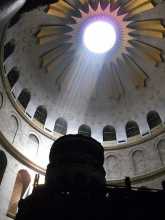This psychiatric syndrome is specific to tourists in Jerusalem
This month's issue of Wired magazine has an interesting look at Jerusalem Syndrome, which is one of those fascinating, location-specific psychiatric conditions. In Jerusalem Syndrome, a tourist who visits Jerusalem is overcome by religious fervor. In advanced cases, the sufferer may actually believe themselves to be the Messiah.
Frequently, an in-patient stay at a psychiatric facility is able to repair this specific sort of psychotic break. But the most effective treatment is to send the patient back to their home country, to their everyday, familiar and neutral turf. Needless to say, psychiatrists and therapists in Jerusalem are all highly trained and experienced in spotting and treating cases of Jerusalem Syndrome.
Jerusalem Syndrome may seem strange, even uncanny or bizarre. But one thing I came to realize, from reading this particular article, was that these sufferers self-select. After all, virtually all of the tourists to Jerusalem are religious people who are there for religious reasons. People travel all over the world all the time, but what might lead someone to visit Jerusalem specifically?
At the same time, there are a lot of people in the world who are hovering at the edge of a psychotic break or fugue state. It may be due to stress, genetics, pre-existing but sub-clinical schizophrenia, drug abuse, or childhood trauma. Sadly, slipping into a delusional state - whether violent or not - is something that happens to people every day.
Therefore, it's reasonable to assume that a certain sub-set of religious people interested in travel are also, shall we say, in a psychiatrically delicate condition. And if there is one thing that Chris Nashawaty's article amply illustrates, it's that visiting Jerusalem is an incredibly intense experience.
Even if you aren't religious, Jerusalem's history, the fervor of the faith of everyone else there, it's twisty turning unmarked alleyways all alike, its unfamiliar sights and smells, the effects of jetlag and exhaustion, all press weightily upon the traveler. It holds this in common with other grand cities and sights - and as Nashawaty points out, many of those other grand cities and sights have their own forms of "Jerusalem Syndrome." Visitors to Florence may find that city's artworks trigger Stendahl Syndrome, and Japanese tourists in Paris are evidently particularly susceptible to Paris Syndrome.
Jerusalem is a powerful trigger, and many people suffering from Jerusalem Syndrome "have some psychiatric history" in the words of Yoram Bilu, an Israeli psychological anthropologist who is interviewed for the article.
